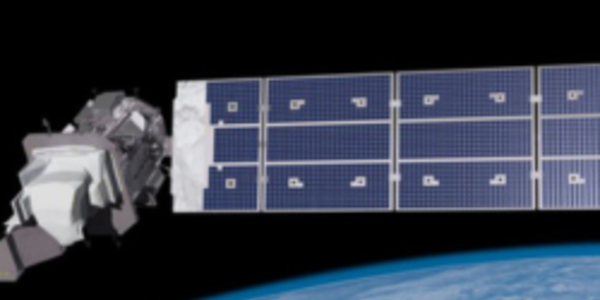
Several of our scientists are attending the 2017 American Geophysical Union (AGU) Fall Meeting from Monday, December 11, through Friday, December 15, in New Orleans, Louisiana. The meeting brings together the Earth and space science community for discussions on emerging trends and the latest research. And, it offers a mix of more than 20,000 oral and poster presentations, a broad range of general sessions, and an exhibit hall with hundreds of exhibitors showcasing new and relevant research tools and services.
If you can’t make it to the AGU Fall Meeting, check out the free on-demand access to live-streamed and recorded on-demand videos. You can browse all the available sessions to see which ones you’d like to view. And, read on below to learn more about some of the latest research, products, and services that our scientists are highlighting at the meeting.
Follow #AGU17 and #NCEIatAGU on social media for more updates on the AGU Fall Meeting and our contributions to it.
Explaining Extreme Events from a Climate Perspective
NOAA and the American Meteorological Society will be releasing the “Explaining Extreme Events of 2016 from a Climate Perspective” report, published as a special edition of the Bulletin of the American Meteorological Society. This sixth edition continues to provide evidence of whether or not human-caused climate change is playing a role in individual extreme events around the world. Our scientists will be participating in a press conference regarding the findings during the AGU Fall Meeting, which will be held at 11:30 a.m. Central Time (12:30 p.m. Eastern Time) on Wednesday, December 13. You can view the press conference via a live webstream at that time.
Preserving and Providing Access to Data
NCEI maintains one of the most significant archives of environmental information on Earth, with comprehensive oceanic, atmospheric, and geophysical data. Every month, we archive over 26 terabytes of data from more than 130 observing platforms. And, we provide access to this extensive array of data through several outlets and in a variety of formats. We regularly evaluate and update both our archive and access methods to ensure we’re providing you with the highest-quality data through the best means possible.
Check out our AGU talks, posters, and presentations for opportunities to learn more about how NCEI preserves and provides access to a treasure trove of environmental data.
Observing Earth from Space
More than a dozen NOAA-operated satellites, along with others in the international community, are currently observing our planet and providing us with vast quantities of data every day. NCEI maintains vast archives of data from the complex sensors and instruments onboard these satellites, which take highly accurate measurements of Earth and our space environment. Together, all of these data provide us with a more complete understanding of our ever-changing planet.
Check out our AGU talks, posters, and presentations for opportunities to learn more about NCEI’s archives of environmental satellite data and the research they support.
Assessing Our Environment and Its Impacts on Our Lives
With environmental data experts on staff, NCEI regularly supports the development of scientific assessments. Our scientists often serve as lead authors, editors, and contributors to reports like the U.S. Global Change Research Program’s recent Climate Science Special Report. NCEI also supports the development of assessments through the Technical Support Unit (TSU), which is housed at our headquarters location in Asheville, North Carolina. Members of the TSU—many of whom work with our partner, the Cooperative Institute for Climate and Satellites–North Carolina—help pull together the knowledge of experts from multiple U.S. agencies to create scientifically accurate, consistent, and clearly communicated reports.
Check out our AGU talks, posters, and presentations for opportunities to learn more about our scientific environmental assessments.
NCEI Talks, Posters, and Presentations
Monday, December 11
- Reprocessing 30 Years of ISCCP: Addressing Satellite Intercalibration for Deriving a Long-Term Cloud Climatology, 8:00 AM to 12:20 PM, Poster Hall D-F
- No Longer Have to Choose, 1:40 PM to 6:00 PM, Poster Hall D-F
Tuesday, December 12
- Data-at-Risk: Identifying, Prioritizing, and Preserving for Future Generations, 8:00 AM to 10:00 AM, 231-232
- Spatial and Temporal Means and Variability of Arctic Sea Ice Climate Indicators from Satellite Data, 8:00 AM to 12:20 PM, Poster Hall D-F
- Validation of the GOES-16 Magnetometer Using Multipoint Measurements and Magnetic Field Models, 8:00 AM to 12:20 PM, Poster Hall D-F
- Collaborative Preservation of At-Risk Data at NOAA’s National Centers for Environmental Information, 9:42 AM to 9:59 AM, 231-232
- Challenges in Defining Tsunami Wave Height, 9:45 AM to 10:00 AM, 243-244
- Advances in Characterizing Extreme Storms, Flood Risk, and Flood Risk Management II, 10:20 AM to 12:20 PM, 293-294
- An Approach Toward Incorporation of Global Warming Effects into Intensity-Duration-Frequency Values, 11:05 AM to 11:20 AM, 293-294
- Assessment of the Long-Term Trends in Extreme Heat Events and the Associated Health Impacts in the United States, 1:40 PM to 1:55 PM, 267-268
- Climate Change Impacts on Human Health and the Environment I, 1:40 PM to 3:40 PM, 267-268
- Characteristics of Recent Tsunamis, 1:40 PM to 6:00 PM, Poster Hall D-F
- Cloud-Based Calculators for Fast and Reliable Access to NOAA’s Geomagnetic Field Models, 1:40 PM to 6:00 PM, Poster Hall D-F
- Utility of High Temporal Resolution Observations for Heat Health Event Characterization, 1:55 PM to 2:10 PM, 267-268
- Observed and Projected Changes in Climate Extremes in the United States, 2:25 PM to 2:30 PM, E2
- Ocean Heat Content Estimation from In Situ Observations at the National Centers for Environmental Information: Improvements and Uncertainties, 4:15 PM to 4:30 PM, 280-282
Wednesday, December 13
- Mapping the Gaps: Building a Pipeline for Contributing and Accessing Crowdsourced Bathymetry Data, 8:00 AM to 12:20 PM, Poster Hall D-F
- North Atlantic Near-Surface Salinity Contrasts and Intra-Basin Water Vapor Transfer, 8:00 AM, 12:20 PM, Poster Hall D-F
- In Situ Global Sea Surface Salinity and Variability from the NCEI Global Thermosalinograph Database, 8:00 AM to 12:20 PM, Poster Hall D-F
- Bridging the Gap Between Data, Publications, and Images, 8:40 AM to 8:43 AM, 231-232
- GOES-R Space Weather Data: Achieving User Ready Products, 9:04 AM to 9:18 AM, 243-244
- Uncertainty Quantification in Geomagnetic Field Modeling, 11:50 AM to 12:05 PM, 217-219
- Extended Reconstructed Sea Surface Temperature Version 5 (ERSSTv5): Upgrades, Validations, and Intercomparisons, 1:40 PM to 1:55 PM, 265-266
- Current Trends in Natural Gas Flaring Observed from Space with VIIRS, 1:40 PM to 1:55 PM, 388-390
- Spatial Data Infrastructure for Earth and Space Sciences: Analyzing, Visualizing, and Sharing Spatiotemporal Earth Science Data Small and Big II, 1:40 PM to 3:40 PM, 228-230
- Saving HEBBLE Data from Oblivion: From Faded Paper Copy to Digital Files, 1:40 PM to 6:00 PM, Poster Hall D-F
- Bridging the Gap Between Data, Publications, and Images, 1:40 PM to 6:00 PM, Poster Hall D-F, Download the Poster
- An Analysis of Ionospheric versus Oceanic Tidal Magnetic Signals, 1:40 PM to 6:00 PM, Poster Hall D-F
- Main Field and Secular Variation Modeling with Defense Meteorological Satellite Program Magnetic Measurements, 1:40 PM to 6:00 PM, Poster Hall D-F
- Estimating Coastal Digital Elevation Model (DEM) Uncertainty, 2:25 PM to 2:40 PM, 271-273
- Big Data Discovery and Access Services through NOAA OneStop, 3:10 PM to 3:25 PM, 228-230
- Pathways for Increasing and Advancing Diversity and Gender Parity in the Next Generation of Geoscientists II, 4:00 PM to 6:00 PM, 242
- Error Estimation of Pathfinder Version 5.3 SST Level 3C Using Three-Way Error Analysis, 4:45 PM to 5:00 PM, 398-399
- Are There Any Upticks in Federally Employed Women and Minorities in STEM at the Leading U.S. Science Agencies?, 5:45 PM to 6:00 PM, 242
Thursday, December 14
- New Multibeam Bathymetry Mosaic at NOAA/NCEI, 8:00 AM to 12:20 PM, Poster Hall D-F
- Spatial Data Infrastructure for Earth and Space Sciences: Analyzing, Visualizing, and Sharing Spatiotemporal Earth Science Data Small and Big I Posters, 8:00 AM to 12:20 PM, Poster Hall D-F
- New GOES High-Resolution Magnetic Measurements and Their Contribution to Understanding Magnetospheric Particle Dynamics, 9:30 AM to 9:45 AM, R06-R07
- Research Integrity, Reproducible Science, and Quantifying Return on Investment in Data and Software Management II: Focus on Challenges with Provenance, Reuse, and Citation, 10:20 AM to 12:20 PM, 228-230
- Customer Use Cases and Analytics for Climate Data at NOAA's National Centers for Environmental Information, 11:10 AM to 11:24 AM, 228-230
Friday, December 15
- Quality and Trustworthiness of Earth Science Data, 10:20 AM to 12:20 PM, eLightning Area
- Information Quality as a Foundation for User Trustworthiness of Earth Science Data, 10:38 AM to 10:41 AM, eLightning Area
- Sustained Assessment Metadata as a Pathway to Trustworthiness of Climate Science Information, 10:44 AM to 10:47 AM, eLightning Area
- Identifying Open Magnetic Field Regions of the Sun and Their Heliospheric Counterparts, 11:50 AM to 12:05 PM, 252-254
- Decadal Variability of Temperature and Salinity in the Northwest Atlantic Ocean, 1:40 PM to 6:00 PM, Poster Hall D-F, Download the Poster
- Pathways for Increasing and Advancing Diversity and Gender Parity in the Next Generation of Geoscientists I Posters, 1:40 PM to 6:00 PM, Poster Hall D-F
- Improved Hourly and Sub-Hourly Gauge Data for Assessing Precipitation Extremes in the U.S., 2:40 PM to 2:55 PM, 291-292
- Use of NEXRAD Radar-Based Observations for Quality Control of In-Situ Rain Gauge Measurements, 4:15 PM to 4:30 PM, 291-292
- A New View of the EVU Solar Corona from the Solar Ultraviolet Imager on GOES-16, 5:00 PM to 5:15 PM, R02-R03



